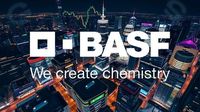The stock market is currently experiencing significant turmoil, with BASF SE, one of Germany's leading chemical companies, facing a dramatic decline in its share price. As of April 7, 2025, BASF shares have plummeted by 5.7% to just EUR 39.17, marking a stark contrast to the company's earlier performance this year. The stock has shed all gains made since the beginning of 2025, a troubling trend that has investors on edge.
On April 2, the Chart Tracker indicated a potential sell-off that could see the stock test its 2023 low of EUR 40.25. That prediction has come to fruition, as the share price now hovers around this critical threshold. With the stock already touching a low of EUR 37.40 earlier in the trading session, analysts are closely monitoring whether this support level can hold. The current market environment is fraught with uncertainty, leading many to question the sustainability of BASF's stock.
Since the beginning of March, BASF shares have lost around 16% of their value, with a notable setback of 5.1% recorded just before the recent decline. This downturn has raised alarms among trend analysts and investors, who fear that the downward momentum could trigger a self-perpetuating cycle of selling. The losses are primarily attributed to ongoing tariff discussions in the United States, which have led to countermeasures from countries like China, further complicating BASF's market position.
Despite the grim outlook, some analysts suggest that the situation may not be as dire as it appears. The recent downturn is largely a consequence of the so-called 'Trump sell-off,' where investor confidence has been shaken by new tariffs and trade policies. As these tariffs are implemented, the hope for lower gas prices and an improvement in business with Eastern markets appears diminished. However, analysts remain cautious, noting that the stock's valuation is influenced more by external factors than by BASF's operational performance.
According to the boerse.de-Aktien-Rating, BASF has been rated a 'C,' indicating it is perceived as a 'loser stock.' This rating reflects a ten-year average price loss of 5% per year, alongside concerning metrics regarding profit consistency and loss ratios. The company's recent performance has led to speculation about its long-term viability, especially as it faces headwinds from U.S. tariffs that could dampen global demand for its products.
Investors who bought BASF shares a year ago are feeling the sting of their investment decisions. On April 7, 2024, the stock was valued at EUR 53.83, and an investment of EUR 1,000 would now be worth only EUR 771.04, representing a staggering loss of 22.90%. Currently, BASF's market capitalization stands at approximately EUR 37.10 billion, a figure that highlights the significant erosion of value the company has experienced in recent months.
Looking ahead, analysts are divided on the future trajectory of BASF's stock. While some maintain a 'Buy' rating, suggesting that the current prices may present a buying opportunity, others recommend caution. Bernstein Research rated BASF as 'Outperform' on April 4, while DZ BANK issued a 'Buy' rating just days earlier. Conversely, Baader Bank has taken a more conservative stance, advising investors to 'Reduce' their holdings.
As of now, the BASF share price remains under pressure, with trading volumes rising significantly as investors react to the unfolding situation. The stock's performance on April 7 saw it drop to EUR 39.04 at 09:28 AM, marking it as one of the day's biggest losers on the DAX 40. This decline follows a previous high of EUR 55.06 reached on March 6, 2025, illustrating the sharp reversal in sentiment surrounding the stock.
Investors are particularly concerned about BASF's exposure to the automotive and construction industries, which are both likely to be affected by the new tariffs imposed by the U.S. government. With a 20% tariff now applicable to European chemical products, BASF stands to lose a significant portion of its market share in these vital sectors. The company has historically relied on these industries for a substantial portion of its revenue, making the current political climate particularly challenging.
In summary, the outlook for BASF is uncertain, and the stock's recent performance raises critical questions about its future. Investors are advised to remain vigilant and consider their options carefully as they navigate this turbulent market. The upcoming financial results for Q1 2025, scheduled for release on May 2, will be crucial in determining the company's short-term trajectory. Experts are currently estimating a profit of EUR 3.30 per share for the year, but whether this will be enough to restore investor confidence remains to be seen.
As the situation evolves, BASF's stock will continue to be a focal point for investors and analysts alike. The interplay between global trade policies, market sentiment, and company performance will ultimately dictate the path forward for this once-stalwart chemical giant.








